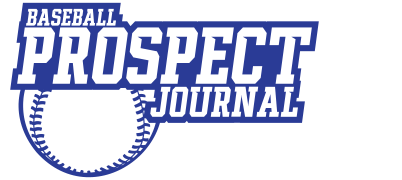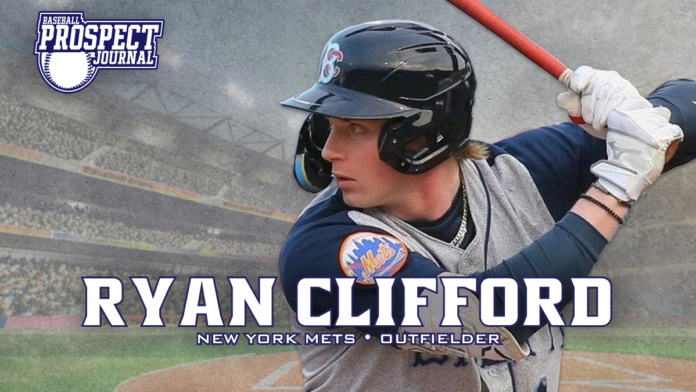BROOKLYN, N.Y. – Athletes frequently encounter the task of handling their emotions and adjusting to new circumstances. This scenario unfolded for Ryan Clifford, a prospect in the Houston Astros organization, who was traded to the New York Mets at the MLB trade deadline alongside Drew Gilbert in exchange for the three-time Cy Young Award winner Justin Verlander.
“It was a quiet feeling at the time of the trade. I didn’t know what to think,” Clifford said. “I didn’t quite know what the next move was, but I was glad that things worked out the way they are for me, and I am glad that I can be a part of the Mets organization.”
The Astros were initially hesitant about including Clifford in the deal. One reason was his recent rise from being an 11th-round draft pick out of Crossroads Flex High School in Cary, North Carolina, to the fourth-ranked prospect in the organization by the time of the trade. Clifford displayed some potential last season with a .412 on-base percentage in 12 games for the Fayetteville Woodpeckers in the Carolina League.
“I think one of the big things the Astros do over there is that they let guys figure things out on their own and set their own routine,” he said. “They give you tips on what they think might work for you and let you take initiative in your own career. The Astros put in a lot of work developing their prospects. It was really promising to begin my career there.”
Clifford progressed to advanced Class A this season and significantly improved his run production at the plate. He batted .271/.356/.547 with 16 home runs and 46 RBIs with the Asheville Tourists, ranking in the top five in offensive categories, such as OPS and slugging percentage in the South Atlantic League.
“I tried to keep things simple at the plate by putting the bat on the ball and making hard contact,” Clifford explains. “There weren’t too many adjustments I made as a hitter. The way the game went was in my favor, and I hope to maintain that approach as well.”
The Mets assigned Clifford to the Brooklyn Cyclones, who play in the same league as Asheville and face a similar caliber of pitching. Clifford immediately made a strong impression by hitting a home run in his first at-bat with the Cyclones on August 3 in Jersey Shore.
He followed that performance with three multi-hit games in his first home series in Brooklyn and blasted a solo home run to the deepest part of Maimonides Park against the Aberdeen Ironbirds.
“Baseball is a game of up and downs, so it was nice to get out on the right foot,” Clifford said. “I just tried to keep a level head and look ahead to the next game. Personally, I wouldn’t say there was a ton of pressure to have a good start, but when you get traded for a guy like Justin Verlander, people might think there is added pressure, but for me, it just about going out there and doing my best.”
After a promising start with the Cyclones, Clifford faced the humbling reality that baseball often brings when he battled through a mid-August slump. His batting average plummeted, and his strikeout rate increased. But he began to persevere towards the end of a 12-game road trip when he had a three-hit game with three runs batted in on September 3 against the Greenville Drive.
“He was struggling of late and was aware of that,” Cyclones manager Chris Newell said. “The kid is a pro who does not hang his head and understands that it is part of the game. He is also willing to allow himself to fail and make the necessary adjustments, and he has a chance to become a very good major league player.”
Clifford generates power as a left-handed hitter by hitting line drives to his pull side. He gets extension by utilizing his physical strength and keeping his wrists back in the zone as the pitcher begins his delivery. The key is adapting to the movement and speed of off-speed pitches late in the count against quality pitching, which will help him improve his overall contact rate.
“For me, it is about recognizing pitches up the zone, early in the count, and keeping the same swing to maintain timing,” Clifford said. “Everyone is different in that regard, but in my case, it is about seeing the pitch and picking it up out of the pitcher’s hand, and everything else falls into place.”
Throughout the season, Clifford has divided his time evenly between playing at both corner positions and first base. He has worked on his speed, agility and quickness at each position. By splitting his time between these spots, Clifford looks to cultivate a versatile set of defensive skills. This includes learning to effectively track the ball, take optimal angles and deliver precise throws.
“My pre-pitch timing in the field has gotten better at each position,” Clifford said. “I have tried to clean up the little things that will allow me to be more effective with my first step quickness. Overall, I am trying to get better reads on the ball and get to my top speed quicker.”
Clifford established his connection to baseball through his close bond with his father, John, a former 19th-round draft pick from Villanova. John spent two seasons in the Colorado Rockies organization in the mid-1990s. Interestingly, Clifford and his father began their minor league careers in Asheville, creating a unique shared experience.
“It was special getting to play in Asheville,” Clifford said. “It was cool to watch an old tape of my dad play there and then go create my own memories as well. My dad has always helped me with the mental side of the game and understanding that there will be ups and downs. The way I play the game, I credit to him and always play and be aggressive in all aspects of play.”
The Mets’ decision to trade Verlander before the deadline sparked various reactions and opinions from industry executives. Some expressed disappointment that the Mets chose to look beyond the 2023 season, while others argued that focusing on rebuilding the minor league system and aiming for future contention is a better long-term strategy for the franchise’s stability.
The final assessment of the moves the Mets made at the deadline will depend on the performance of prospects like Clifford and Gilbert and their ability to reach the major leagues. For now, Clifford looks to make a noticeable impact on his new team while demonstrating the potential he exhibited during his time in the Astros farm system.
“I want to go out there and put my team in the best position to win every day,” Clifford said. “The Mets do a good job of letting us go out there and play. They have a lot of great players on the field at one time in their minor league system, and if all do what is expected of us, then things will go our way on the field.”


